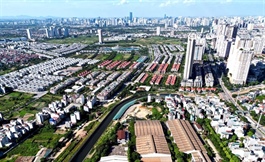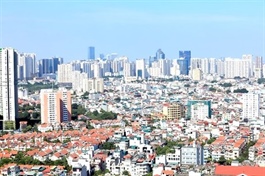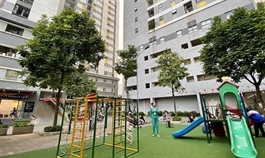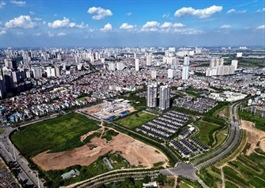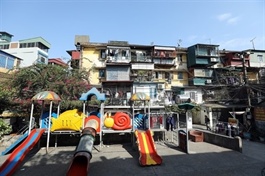Fresh hopes for real estate in 2025
Fresh hopes for real estate in 2025
Next year is anticipated to mark the beginning of a new development cycle for Vietnam’s real estate market, with expectations of continued recovery and growth, particularly in major cities like Hanoi and Ho Chi Minh City.

According to Kiet Vo, director of Residential Project Marketing, CBRE Vietnam, 2024 served as a transitional year, bridging the old and new phases of the market. He noted that key legislative changes would play a pivotal role in shaping the industry’s trajectory.
“Together with three important laws – the Land Law, the Housing Law, and the Real Estate Business Law – taking effect from August, it will create a legal corridor and a favourable premise for the next market period. Therefore, 2025 is considered the first year of a new development cycle,” Kiet said.
Kiet predicts that the real estate market will maintain its recovery trend in 2025 at a pace similar to that of 2024. In the northern market, Hanoi is expected to remain at the core of this new cycle, with an anticipated supply of 25,000-30,000 units. In contrast, Ho Chi Minh City’s supply will be more modest, at around 7,000-8,000 units.
Kiet also highlighted that the real estate market in 2025 is likely to develop more stably and sustainably, thanks to supportive factors such as a clearer legal framework and the valuable experience gained by investors through previous market cycles. However, he cautioned that a return to the vibrant golden period of 2018-2019 would require several more years.
Nguyen Quoc Anh, deputy general director of PropertyGuru Vietnam, believed that from the second quarter of 2025, the real estate market will enter a period of prosperity, with property prices expected to rise steadily. He observed that market confidence is improving, driven by increased interest in real estate, better investor sentiment, and a more stable economic environment.
“At present, the real estate market is in a new cycle, with its context shaped by three key factors: credit, interest rates, and policies. New laws set to take effect will act as catalysts for recovery,” Anh said.
He explained that the market’s trajectory would vary across different phases. Until the end of the first quarter of 2025, the market will remain in a consolidation phase, with buyers focusing on actual housing needs. Private houses and townhouses are likely to dominate buyer preferences during this time.
From the second to the fourth quarter of 2025, the market is expected to experience strong growth, led by high-profit segments such as land plots and project villas. The stable cycle projected for 2026 is expected to see rising prices and liquidity across various property types.
A real estate market outlook report released in November by Vietcap Securities aligns with these forecasts. The report noted that by the third quarter of 2023, Vietnam’s housing market had hit its lowest point and begun a gradual recovery. Hanoi’s apartment segment is projected to lead this recovery.
The report also highlighted an increase in preparatory activities for launching new projects and improving homebuyer confidence. These factors are expected to support growth in primary real estate transactions in 2024 compared to the previous year.
Looking ahead to 2025, Vietcap believes that real housing demand – comprising buyers looking to live in or rent out properties – will remain strong, with mid-range apartment projects being the primary focus. Additionally, investment buyers, particularly those seeking long-term asset accumulation, are anticipated to return to the market, targeting select low-rise housing products.
Homebuyers are expected to favour projects from reputable developers with proven track records in legal transparency, handing over land use and housing rights certificates, and delivering strong after-sales service. Strategic locations with good infrastructure and amenities will also be a significant factor in purchasing decisions.







